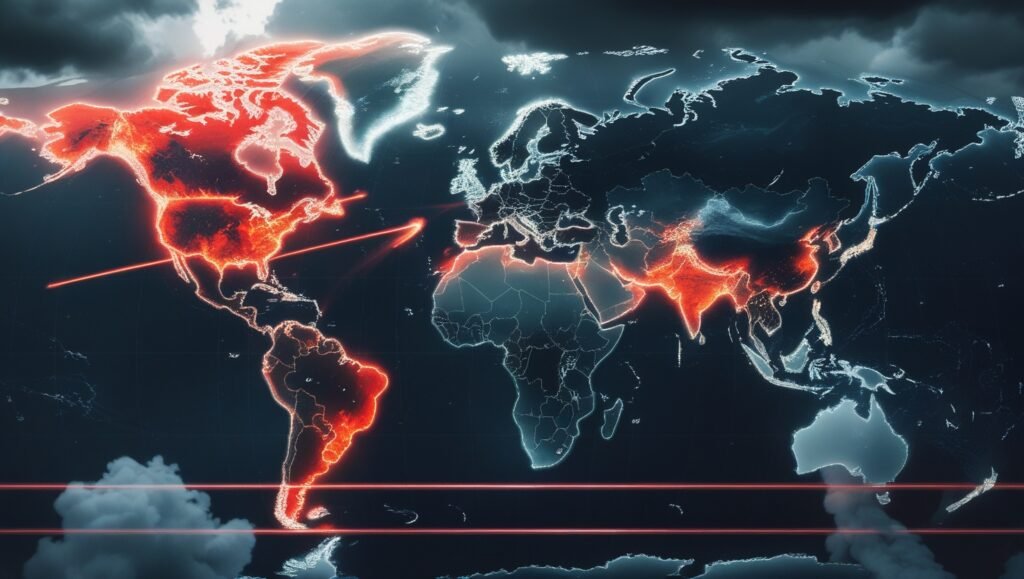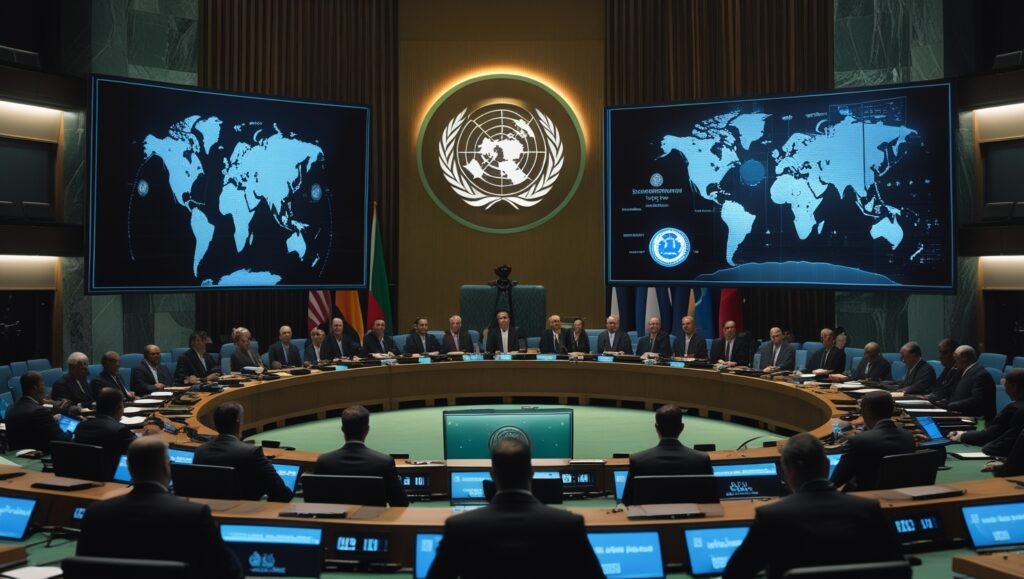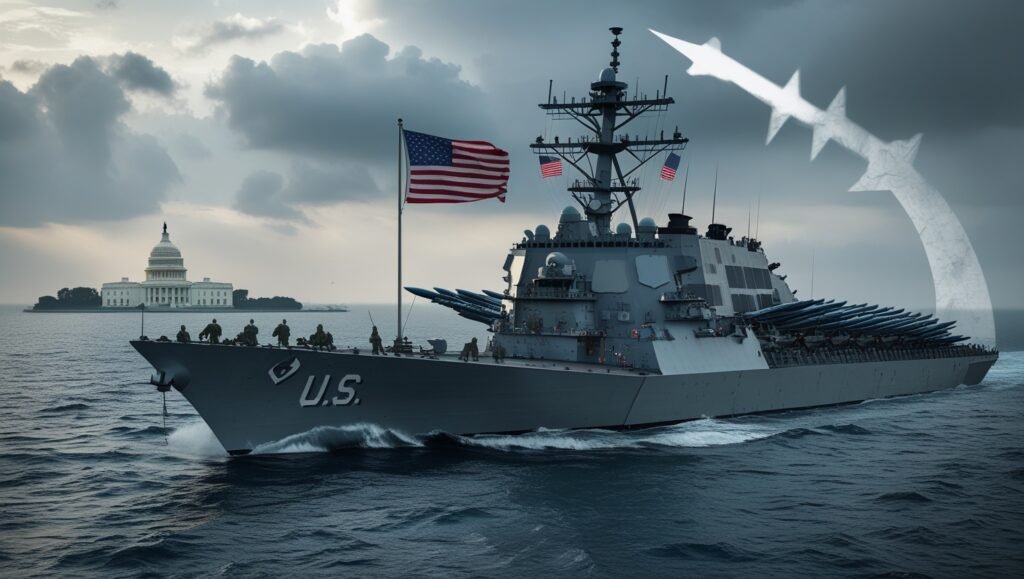Introduction

Not only have the Middle East been rattled by the start of war between Iran and Israel in 2025, but the rest of the world has been rocked by it as well. This clash takes on the burden of centuries of hatred, geopolitical vying, and international politics, in a world that is already weary with proxy wars, the ability to annihilate governance through nuclear weapons, and international manipulation.
To the world, the skies of Tel Aviv, Haifa, and Tehran are blazing and now, the majors in the world, the United Nations, the United States, Russia, and China are all reacting based on words and policies that have taken a calculated road.
So, what do these countries mean by this? And what is more important, how do their reactions bode on the future of international stability?
United Nations: The Demand to Peace in the Power Gridlock

In its rapid response to the outbreak, the United Nations bridged the gap between the first missile attacks and convened an emergency session by the Security Council only a few hours late. The rising violence was a great concern to Secretary-General Antnnio Guterres who reported that the Middle East region was at the edge of a much wider regional catastrophe.
But it has been hard to find unity in the UN. Most countries have advocated a ceasefire but geopolitical hostilities between permanent members of the Security Council, notably the US with Russia and China, have stood in the way of collective resolutions. Other UN-based humanitarian organizations such as the World Food Programme and UNICEF have demanded the establishment of safe passages of the civilians trapped in Gaza and southern Lebanon.
The reaction by the UN despite its neutral position has been faulted as one that lacks any substantive enforcement powers. Again, the organization finds itself sandwiched between noble ideas and politics at a standstill.
United States: Supporting Israel, Threatening Iran

The United States was quick to reaffirm a long time alliance with Israel. In a nationally televised statement President Joe Biden declared, “The United States strongly supports Israel against aggression and will protect our shared democratic values.” Since then, American warships have gone closer into the Eastern Mediterranean and emergency weapons shipments have been sent urgently to Tel Aviv.
As a point of convergence, the U.S. State Department has initiated backdoor channels with its European and Arab allies in an attempt to ensure that the conflict does not overflow to other neighboring regions. As much as the U.S. keeps supporting the right of Israel to defend itself, pressure is mounting in congress and among the civil society within the country to bring the interests of the country to prevent the prolonged war to protect the lives of civilians.
U.S. initiatives at an international level have come into sharp criticism with regards to international neutral countries that point out at the U.S. having a certain level of double standards as far as supporting Israel’s intentions in the conflict; however criticizing similar actions at the part of others in conflict situations.
Russia: Betwixt and Between Allies
Russia has been circumspect, telling the sides to observe maximum restraint and lamenting what it termed as western provocation. Russia keeps strong relations with Iran as they are allies in the military as well in the economic sector, especially in Syria. Meanwhile, Russia has not wanted to lock horns with Israel, with whom it has a rather balanced working relationship in terms of coordination of airspace in Syria.
Russian diplomats have demanded peace talks including a multilateral framework and this is an indication that Russia might be willing to mediate. Off the record, insiders feel that Russia is taking advantage of the circumstance to divert the attention of the world back to the Middle East instability where Moscow has had some influence in the past.
China: Peace Maker or bystander?
The response that China has had has been rather careful. Beijing has also not taken sides though it has demanded a ceasefire to begin with. Instead, it has been the theme of Chinese foreign policy to stress “sovereignty, stability and non-interference” by Chinese leaders.
China has extensive economic stake in the Middle East as opposed to the U.S. or Russia. The war poses a danger of disruption of majoropic energy supplies because China has been among the biggest importers of oil and oil products in the Gulf countries. Analysts recommend that China would prefer to consolidate the markets than engage in politics.
Many had thought that with its development of diplomatic influence, Beijing would at least play a mediating role, but up to now, China has rather revolved into a back seat, brokering quietly between Tehran and Washington, without making any spectacular public gestures.
The European and the Greater International Reaction
The European Union spoke against the shoot and demanded an immediate ceasefire. France together with Germany have insisted on humanitarian aid to Gaza and the southern part of Israel, whereas the U.K. has been more at par with the U.S help to Israel. In the meantime, such countries as Turkey and South Africa have adopted more pro-Palestinian stances.
India as one of the most important players in the world showed its deep concerns and was willing to mediate. Brazil and Argentina were upset at attacks against civilian populations on both sides.
The war has created protests even in countries as far apart as it is possible to be and thousands of people have taken to the streets sympathising with either state and further dependent on local politics and diaspora communities.
Markets and Economic Effect
The world oil prices jumped instantaneously when the war commenced with Brent crude breaking above the 110 levels. The investors were concerned that the supply chain of the Persian Gulf would be in danger of instability. Some international stock markets also suffered in the initial few days and that too particularly in the case of energy and airline stocks.
The global corporations started to reconsider their transportation and travelling warnings, and the maritime transportation across the Red Sea was enormously threatened. Ships and airlines that conduct their business in the region have an insurance cover that increased overnight.
Real World Humanitarian Response
Emergency appeals were issued by international aid agencies such as the Red Cross, the Medecins Sans Frontieres (Doctors Without Borders) and Save the Children. Lebanon, Jordan and southern Syria started to clog up with thousands of refugees in refugee camps.
In the Middle East, airports in Israel, Iran and Lebanon were under permanent threat and international flights were diverted. There was great displacement and anarchy in border regions, particularly those in the north of Israel, and the south of Lebanon.
Advantages and Disadvantages to the World Response
Pros:
- Avoids unilateral action with the help of diplomatic pressure
- Creates room to humanitarian response
- Describes the need of multilateral coordination
Cons:
- Veto powers to the UN gridlock
- The U.S. and Western reaction regarded by many as partial
- Russia and China are perceived to be opportunistic countries instead of being peace oriented
Conclusion
The response of the world to the Iran Israel war of 2025 can be described as both supportive, worried and strategic silence. The UN makes calls of peace and everyone, but remains helpless, whereas the U.S. is so eager to support Israel, Russia tries not to make choices between its allies, and China awaits behind praying for its economic benefits.
It is not that it is a mere war between two nations but how the global power politics is played out during a crisis. The one lesson to be learned is that even when the possibility of a catastrophe exists diplomacy is still in pieces and peace is as thin as ever.
Read More: Biztechtime


